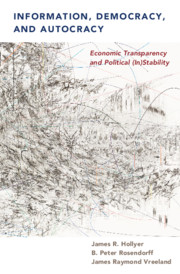Book contents
- Frontmatter
- Dedication
- Contents
- Figures
- Tables
- Acknowledgments
- 1 A New Approach to the Study of Transparency
- PART I FACETS OF TRANSPARENCY
- PART II POLITICAL (IN)STABILITY
- 5 Transparency and (In)stability: The Theory
- 6 The Evidence: Examples and Descriptive Data
- 7 The Evidence: Regression Analyses
- PART III WHY DISCLOSE
- CONCLUSION
- References
- Name Index
- Subject Index
5 - Transparency and (In)stability: The Theory
from PART II - POLITICAL (IN)STABILITY
Published online by Cambridge University Press: 17 September 2018
- Frontmatter
- Dedication
- Contents
- Figures
- Tables
- Acknowledgments
- 1 A New Approach to the Study of Transparency
- PART I FACETS OF TRANSPARENCY
- PART II POLITICAL (IN)STABILITY
- 5 Transparency and (In)stability: The Theory
- 6 The Evidence: Examples and Descriptive Data
- 7 The Evidence: Regression Analyses
- PART III WHY DISCLOSE
- CONCLUSION
- References
- Name Index
- Subject Index
Summary
Toppling a political regime requires dangerous collective action. Governments can crush small protests with ease. Protestors may be jailed, tortured, disappeared, or killed. Under a vicious government, similar fates may await their families and loved ones. As dissatisfied with a regime as a citizen may be, she does not want to participate in a failing movement to overthrow the government. The coordination of mass discontent thus stands as an obstacle to mass movements – especially under autocracy. Autocrats count on fear of retribution to keep the masses from taking to the streets.
We therefore take an approach inspired by the global games literature to examine the effect of transparency on mass unrest. Global games, first developed by Carlsson and Van Damme (1993), examine the strategic actions of individuals who receive (potentially) correlated signals about the state of the world. Economists have employed these models to explore different types of collective action problems, such as bank runs, currency crises, and commodity bubbles (Morris and Shin 1998; Angeletos and Werning 2006; Hellwig, Mukherji, and Tsyvinski 2006). Political scientists have used these models to explain problems of authoritarian control, revolutions, and democratic consolidation (Svolik 2008, 2012, 2013a, 2013b, 2013d, 2015, Boix and Svolik 2013; Shadmehr and Bernhardt 2011, 2015, n.d.; Casper and Tyson 2014; Little, Tucker, and LaGatta 2015; Little 2016, 2017).
In our model, citizens receive signals about the state of the economy. These signals can be associated with more or less “noise,” depending on the level of transparency. Intuitively, a highly noisy signal is one that conveys little credible information to citizens about the true performance of the economy – government announcements bear little relation to reality. A more accurate signal conveys a clearer and more credible reflection of aggregate economic performance. We operationalize this noise in our theoretical model below as a random draw from a normal distribution centered on zero. This distribution may have high or low variance. Under low levels of transparency, the signal can be so noisy that the citizens have little idea of how the economy is really performing – they only know their personal experience. When transparency is high, however, citizens have a more accurate picture of aggregate economic performance. Thus, transparency serves to inform citizens of the experiences – and beliefs – of others outside their family or immediate social circle.
Information
- Type
- Chapter
- Information
- Information, Democracy, and AutocracyEconomic Transparency and Political (In)Stability, pp. 92 - 139Publisher: Cambridge University PressPrint publication year: 2018
